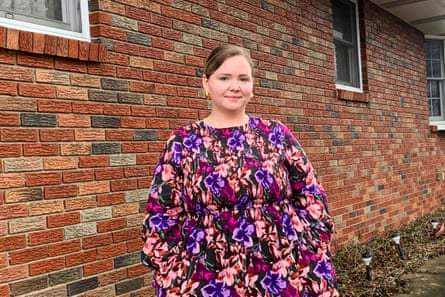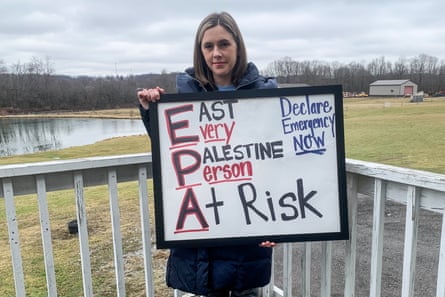It started with the smell: a saccharine, chemical odor. Hilary Flint noticed it as soon as she walked into her home in Enon Valley, Pennsylvania, one day last February.
“It was something like I’d never smelled before,” said Flint, who spoke to the Guardian from her kitchen for a special edition of the Politics Weekly America podcast. “I describe it as sweet bleach.”
On 3 February 2023, a train careened off a track four miles away from Flint’s home in East Palestine, Ohio. Authorities soon learned it was carrying thousands of gallons of hazardous chemicals, including vinyl chloride, a carcinogenic petrochemical gas used in plastic production.
Three days later, authorities set fire to the vinyl chloride in an effort to prevent a dangerous explosion, producing a huge black funnel cloud. Residents immediately began complaining of strange odors as well as nausea and headaches.

Now, a year after the derailment, federal and local officials insist East Palestine and the surrounding regions are safe.
“We’re confident that the residents of East Palestine are not at risk from surface water, soil or air from the derailment,” a senior Biden administration official told reporters on Wednesday.
Meanwhile, Norfolk Southern, the train’s owner, says it has committed or invested more than $103m for the community to rebuild.
But many locals remain unconvinced that their homes are free of pollutants, and are still struggling to get their lives back on track.
Residents said they had received conflicting information about contamination from the crash, and about their access to aid. And some feel officials aren’t listening to their concerns – both about this disaster and the need to prevent similar ones in the future.
Varying data
Flint wasn’t in the mandatory evacuation zone for the controlled vent and burn on 6 February, but she fled town anyway, the ominous black plume visible in her rearview mirror. The following morning, authorities said the operation was a success.
Soon after she returned home, she began experiencing muscle aches, migraines and fatigue – especially concerning because she’d recently battled cancer.
Flint asked the Environmental Protection Agency (EPA) to test the air in her home; they informed her they would only be collecting data within a one-mile radius of the derailment. But researchers from Wayne State University collected samples from her home and found compounds associated with the derailment clinging to air filters, including vinyl chloride and ethylhexyl acrylate, which is also used to make plastics and may be linked to cancer.

The EPA told the Guardian those compounds were commonly found in household products like adhesives and paint. They reviewed the university’s data, but said they did not have enough information about the study to determine Flint’s level of risk.
Judy Westrick, who directs Wayne State University’s Lumigen Instrument Center and tested Flint’s home, said she would not expect those compounds to appear on home air filters under normal circumstances. .
And Flint feels she’s being “gaslit”. She spends most of her time these days in upstate New York in an effort to avoid chemical exposure.
Inconsistent communication
Flint isn’t the only one who feels unsafe in her old home.
The night of the derailment, Zsuzsa Gyenes was making Valentine’s day crafts with her nine-year-old son in their East Palestine home. From their window, they noticed a fire on the train line. Within hours, she, too, began smelling a sweet, chemical odor. Her head pounded and her lips went numb.
Around 3am, her son began to projectile-vomit and gasp for air. It was “terrifying”, Gyenes said, particularly because he’d been hospitalized for asthma on several occasions. She bundled him into the car and drove to a hotel 20 miles away.
They haven’t slept at home since. Gyenes has heard authorities say she can do so safely, but she still hears about reports that officials have raised issues with air testing methods used in the area and stories about her old neighbors falling ill.

Gyenes spoke with the Guardian from the motel room she lives in with her son and cat, about 30 miles from East Palestine. Like dozens of other families, they received relocation assistance from Norfolk Southern after the derailment.
“I don’t think I’d have been able to afford to relocate otherwise,” she said, estimating Norfolk Southern had paid $40,000 for her hotel stays so far. “We’ve been bouncing between hotels and motels and that adds up.”
Recently, Gyenes has been racked with anxiety about losing those benefits. The company has said it will stop relocation assistance for some residents on 9 February, following the conclusion of a major soil remediation effort in October.
Gyenes said she was told by two different Norfolk Southern representatives on Monday that her aid will be “cut off” that day.

But company spokesperson Connor Spielmaker told the Guardian this week that since Gyenes was not among the 40 households prompted to move by their soil cleanup project, she will not be affected by the 9 February cutoff date.
“Not sure where the confusion came from, but that’s not accurate,” he said on Wednesday.
That morning, Gyenes received a call from the company clarifying that her benefits will not be cut off – a change she attributed to “the magic of media pressure”.
But her relief is marred by frustration, and the miscommunication has left her feeling jerked around.
“It’s re-traumatizing on a daily basis,” she said in a text message. “It’s infuriating.”
The controlled burn
Another instance of conflicting reports: whether it was necessary to vent and burn the vinyl chloride in the first place.
In the days after the derailment, experts on the scene had to decide if the vinyl chloride on the train was at risk of undergoing an explosive chemical reaction. Norfolk Southern’s director of hazardous materials, Robert Wood, testified in a June hearing before the National Transportation Safety Board that a controlled burn was a necessary last resort.
But in the same hearing, a representative from OxyVinyls, the company which owned the vinyl chloride, testified that his team had told Norfolk Southern on three separate occasions that they didn’t believe an explosion was going to happen – information that was never shared with authorities on the scene.
The National Transportation Safety Board is investigating the communication breakdown that followed the derailment.
“Part of our investigation is what information they were provided, what information they had, and what information was shared,” the agency’s chair, Jennifer Homendy, said.
The final report will be released later this year, she said.
‘This is going to happen again’
Experts and advocates say in the absence of major policy change, such a disaster could happen again. Clyde Whitaker, Ohio director of the International Sheet Metal, Air, Rail Transportation union, for instance, says prevention will require much stricter regulations on railways.
Whitaker predicted a derailment like East Palestine many months before the disaster. For years, he watched in horror as the US railway industry cut its workforce and made trains longer – something the sector said had boosted efficiency, and data shows has boosted its profits.
Months before the derailment, Whitaker had also filed complaints to the Federal Railroad Administration, saying Norfolk Southern had been telling workers to override alerts from defect detectors in an effort to keep freight moving. (Norfolk Southern, for its part, has not commented on this alleged practice or whether this happened during the February 2023 derailment.)
Now, Whitaker is advocating for a bipartisan bill that would instate stricter regulations and safety precautions for the rail sector. But the bill has stalled on Capitol Hill. Meanwhile, workers and communities are still in danger as trains full of toxic chemicals run every day.
“If this safety bill doesn’t get passed,” he said, “this is going to happen again.”
Other advocates are taking a different tack to prevent the next East Palestine derailment, by fighting to get hazardous compounds off trains.
Jess Conard, an East Palestine resident who is also regional director for the anti-plastic pollution non-profit Beyond Plastics, for instance, has been advocating for changes in the petrochemical sector.

She didn’t know anything about vinyl chloride before the derailment. But since that “horrifying night”, she has focused all her efforts on trying to get the chemical banned across the US.
“We really have an opportunity to create global change … from a chemical perspective,” she said.
She has seen some success. Last month, the EPA announced a health review of the chemical – the first step toward a potential ban.
But unless a full ban follows, she said, another dangerous derailment could be around the corner.
More resources
On Wednesday, White House officials said Joe Biden would visit East Palestine, marking his first visit since the derailment.
But many advocates say the visit is not enough, and are also demanding more resources.
“You don’t show up to somebody’s house late empty-handed,” said Conard. “You grab your best bottle of wine.”
Among the top asks is a disaster declaration from the Federal Emergency Management Agency (Fema). The community group Unity Council for East Palestine, with which both Gyenes and Flint organize, has been demanding the declaration – which would free up federal funding – since March, and Ohio’s Governor Mike DeWine echoed that request in July.

In September Biden signed an executive order appointing a Fema coordinator to oversee Norfolk Southern’s community response. But the disaster declaration request is still open.
Senior Biden administration officials said this week that it was too early to say what additional federal resources the community required.
Advocates have made other requests, too, including additional air testing.
Gyenes says some residents want to move on and “forget the disaster”. But without more clarity, she’s not sure how she can.
“There’s no consistency in what we’re hearing, and no one’s listening,” she said. “That’s what we’ve got to fix.”
from U.S. - Latest - Google News https://ift.tt/o95UMdT
via IFTTT
Tidak ada komentar:
Posting Komentar